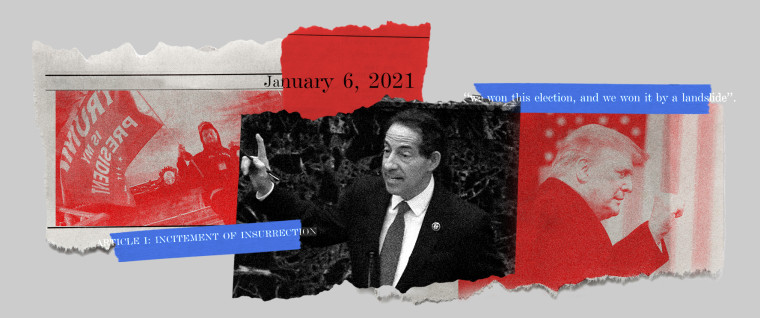Tuesday hurt more than expected. I knew the House impeachment managers intended to show video from Jan. 6 as part of former President Donald Trump's trial. I just didn't think it would happen so soon.
Senate leadership had agreed to set the first day of the trial aside for the parties to debate whether it was constitutional to try an impeached president, the preferred question for the Republican caucus. The fireworks would come later, I thought.
Instead, what followed over the next four hours was a stark delineation between two versions of America: On one hand, the confusing alternative version of reality that overwhelmed the country under Trump's presidency; on the other, a fact-based appeal to the better angels of our nature and the rule of law. That there was even a choice says unfortunate things for the country's future.
The lead impeachment manager Rep. Jamie Raskin, D-Md., spoke for only three minutes before he played a 13 minute video interspersing Trump's incendiary speech to his supporters with the violence those supporters wrought on the U.S. Capitol.
It was a gut-wrenching recap. Even though the nation had watched it all play out live, even though I was glued to Twitter throughout the 7½-hour siege, it was still astonishing to see the strands of video stitched together. The steady drip of new video on the day of the attack didn't overwhelm the psyche the way this video did.
But it wasn't the most emotional moment Tuesday. That came from Raskin himself. Before he turned the floor over to the former president's lawyers, Raskin recounted his experience of events on Jan. 6 to the senators sitting at their desks.
He told them how he had just buried his son the day before but needed to perform his constitutional duty by voting to accept the presidential electoral votes. He told them about the fear he felt as the rioters pounded on the House Chamber door. He told them that his daughter and son-in-law had crouched under desks, sending texts that they thought could be their last.
Then Raskin told the Senate about his daughter's reaction after they were reunited. Only then did his voice break. "I told her how sorry I was, and I promised her it would not be like this again, next time she came back to the Capitol with me," he said.
"'Dad, I don't want to come back to the Capitol,'" Raskin said she responded. It took him a moment to compose himself again.
"Of all the terrible brutal things I saw and I heard on that day and since then, that one hit me the hardest," Raskin said. "That and watching someone use an American flagpole, with the flag still on it, to spear and pummel one of our police officers, mercilessly, ruthlessly."
If the video he introduced was a solemn, unwavering compilation of the contempt for democracy that Trump harnesses and amplified, I'm willing to say Raskin embodied the apotheosis. In ways that Trump himself never managed in four years as president, the congressman from Maryland, a former law professor, was overwhelmed with his devotion to the small-d democratic ideal.
After a 10-minute recess, Bruce Castor, one of Trump's attorneys, followed with an understated dismissal of Raskin's emotionality. The Senate, he implied in his 48-minute speech, was made of better stuff than to let raw feelings dictate its judgment. His partner, David Schoen, then proceeded to berate the senators while waving around a heavily indexed copy of the Constitution.
And yet, despite Raskin's appeals, despite the clear and compelling arguments that Reps. David Cicilline and Joe Neguse presented, it was painful to see Sen. Bill Cassidy of Louisiana become the only GOP member to change his mind. He joined five other Republicans and all 50 Democrats to decide that, yes, it is constitutional to try a former president.
It's true that impeachment is a political act. But contrary to the argument of Republicans who suggest that it's being used as a fiendish weapon against Trump, it just means that it's intended to punish crimes against the body politic, crimes like those the former president committed in the weeks after the election, leading up to Jan. 6.
As it stands, 44 Republicans refuse to see that this case is about something more basic and foundational than "what does this mean for us politically." Specifically, it is asking them what accountability looks like in a country where the leaders come from among the people and are answerable to them. What price should be paid when leaders, like Trump, try to erase that notion?
Those are the questions the impeachment managers will ask to try to convince 17 Republicans starting Wednesday, the first of two days they have to lay out their case. It's an uphill climb, but in the end, every senator will be put on the record answering whether he or she thinks the future of democracy in America looks like Jamie Raskin — or Donald Trump.

